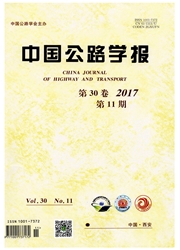

 中文摘要:
中文摘要:
为了提高插电式混合动力汽车催化器的转化效率,提出了催化器温度偏离其适宜温度区间时采用附加代价函数实现温度补偿。在此基础上,以发动机燃油消耗和催化器温度偏离适宜温度区间的附加代价为目标函数,依据庞特里亚金极小值原理建立了Hamilton函数,对目标泛函进行求解,获得了计及催化器转化效率的实时控制策略,并将该实时控制策略与未计及催化器转化效率的实时控制策略进行了比较。结果表明:相比于未计及催化器转化效率的实时控制策略,计及催化器转化效率实时控制策略的油耗增加了2.2%,但HC排放、CO排放和NOx排放分别下降了17.9%、25.9%和24.5%,即计及催化器转化效率的实时控制策略在燃油经济性损失不大的情况下可大幅度改善车辆的排放性能。
 英文摘要:
英文摘要:
Abstract: In order to improve the catalytic converter's efficiency of plug-in hybrid electric vehicle, the additional cost function was proposed to achieve temperature compensation when the catalyst temperature deviated from the suitable temperature range. On the basis of this, the engine fuel consumption and the additional cost when catalytic converter temperature deviated from its suitable temperature range were considered as the objective function, the Hamilton function was established according to Pontryagin minimum principle, and the real-time control strategy considering converter's efficiency was obtained after solving the objective function. This real-time control strategy was compared with the real-time control strategy without considering the converter's efficiency. The results show that comparing to the real-time control strategy without considering the converter's efficiency, the one considering converter's efficiency increases by2.2%in terms of fuel consumption, but HC emission, CO emissions and NOx emissions decrease by 17. 9%, 25. 9% and 24. 5%, respectively. Therefore, the real-time control strategy considering the converter's efficiency can greatly improve the emission performance of vehicle with little cost of fuel economy.
 同期刊论文项目
同期刊论文项目
 同项目期刊论文
同项目期刊论文
 期刊信息
期刊信息
